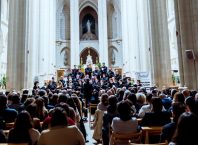“It is always a pleasure,” said Philip de la Croix, director of Mezzo, who visited Israel for the third time this past week. “I really love this country. I hope to establish new partnerships, working with Israeli artists and productions.” Plans are already underway to broadcast the Israeli Opera’s scheduled performance of Verdi’s Nabucco at Masada in June 2010, but he adds, “We want to do more.”
Doing more is an appropriate motto for the energetic de la Croix. In the two years since he became director, the classical-jazz channel has developed both in terms of programming and technology. The subscription to the channel has grown as well: from 15 million subscribers two years ago, to 16 ½ million today, reaching 39 countries. In Israel, Mezzo is offered as part of the HOT and YES channels basic packages, and there are over one million subscribers combined. De la Croix interprets this as indicating that they make this offer in response to their awareness that Israelis want this program.
Some of Mezzo’s plans for the future include a new logo for the channel which will be launched in January. Starting in September Thursday primetime (19:30 to 21:30) will be dedicated to jazz, completing the current schedule of Friday – classical, Saturday – opera and Sunday – dance. De la Croix emphasizes that “dance” includes both classical and contemporary, noting, “I think we have broadcast every production of Batsheva.” A new “rendezvous” has been created; every Sunday morning there is a program of sacred music, of which he says, “Amazing, it is the most successful part of the schedule.”
Live broadcasting is another area that has developed in recent years. “It gives musicians a very unique excitement. It’s a very close situation to a live concert…it gives a live dimension that didn’t exist two years ago,” says de la Croix, adding that for the past three years Mezzo has been recording solely in HD and in January will launch a new Mezzo channel with 5.1 sound in HD. Yet another innovation is a decision to localize Mezzo: “The first attempt will be in the Netherlands, this is the country with which Mezzo has the longest history, the first outside France. There is a big demand to have a Dutch version of everything. The next will be in Russian, which will probably also be offered in Israel.”
Addressing the issue of language, de la Croix acknowledges: “Language can be a problem. Please forgive us for subtitles more in French than other languages. French law obliges the company to do so.” He does not view having both French and English subtitles as an appropriate solution, due to the importance of the visual dimension of the programs. “Two lines of subtitles – it is really a big problem when you are watching an opera. In a well-known opera you know the story. You know Carmen even if you do not speak French.”
The average age of Mezzo viewers is 45. Asked whether he is concerned by reports that the average age of jazz fans has gone up, de la Croix is not discomfited in the least, noting that as people live longer, the number of older people in the population has grown, adding: “I was a journalist for 25 years and this is an eternal question: where is the young audience? The fact that the question has been asked for so many years proves that it is not a problem.” He makes an insightful distinction between the type of musical programming offered by Mezzo (classical and jazz) and that of rock channels, whose two minute, three second format is “the opposite”: “You need time to understand what music is, it takes time, a duration of understanding of this music. The needs of classical and jazz music are different; you have to take time to understand it. I would never imagine to get rid of classical book in my library. I may not look at it every day, but when you want to refer to this book, you want it to be available. You don’t necessarily watch Mezzo 24 hours a day, but it offers the opportunity to view a classical or jazz concert.”
In March 2008 Mezzo offered audiences the opportunity to view the final stages of the Arthur Rubinstein competition live for the first time. Israeli pianist Roman Rabinovich, who was awarded the Silver Medal in the competition, also received a prize from Mezzo and performed in a concert which will be broadcast on the channel in September.
The well-travelled de la Croix, who devotes much of his time to personal visits to the countries where Mezzo is offered, concludes by saying, “Music is international. Who cares about the nationality of a violinist or composer? Of course there are [cultural] differences and these are very interesting. I just returned from a meeting at the Israeli Opera and on their schedule for the 2009-2010 season are two French and two Italian operas. Music is the most fantastic way to unify people.”
Image credit: Maxim Reider





